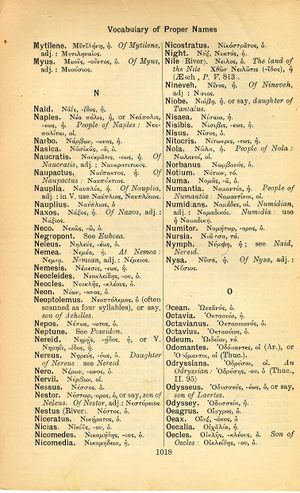Nicomedia
Βίων δύο ἔλεγε διδασκαλίας εἶναι θανάτου, τόν τε πρὸ τοῦ γενέσθαι χρόνον καὶ τὸν ὕπνον → Bion used to say that we have two teachers for death: the time before we were born and sleep | Bion said that there are two rehearsals for death: the time before being born and sleep
English > Greek (Woodhouse)
Νικομήδεια, ἡ.
Latin > English (Lewis & Short)
Nīcŏmēdīa: ae, f., = Νικομήδεια,
I the capital of Bithynia, now Izmid, Plin. 5, 32, 43, § 149; Amm. 22, 9, 3; Aur. Vict. Caes. 39, 45.—Hence,
II Nīcŏmēdenses, ĭum, m., the Nicomedians, Plin. et Traj. Ep. 37 (46), 1; Dig. 50, 9, 5; Inscr. Grut. 389, 2.
Latin > French (Gaffiot 2016)
Nīcŏmēdīa,¹⁴ æ, f. (Νικομήδεια), Nicomédie capitale de la Bithynie] : Plin. 5, 148 ; Amm. 22, 9, 3 || Nīcŏmēdēnsēs, ĭum, m., habitants de Nicomédie : Plin. Min. Ep. 10, 37, 1 ; Dig. 50, 9, 5.
Latin > German (Georges)
Nīcomēdīa, ae, f. (Νικομήδεια), von Nikomedes erbaute Stadt in Bithynien, Hauptstadt des Reiches, Residenz der Könige, j. Ruinen bei Isnikmid, Aur. Vict. de Caes. 39, 45. Amm. 22, 9, 3. – Dav. Nīcomēdēnsis, e, nikomedensisch, Plin. ep. – Plur. subst., Nīcomēdēnsēs, ium, m., die Einwohner von Nikomedia, die Nikomedenser, Plin. ep. u.a.

